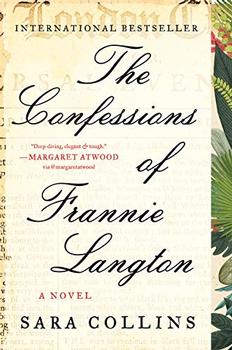Summary | Excerpt | Reading Guide | Reviews | Beyond the book | Read-Alikes | Genres & Themes | Author Bio

I recently watched the television miniseries based on Margaret Atwood's novel Alias Grace. That book—a historical novel in which a young Canadian servant is accused of having murdered her employers—deftly employs an unreliable narrator to keep readers questioning the nature of truth and the reliability of memory. But it also raises important questions about agency and the right to tell one's own story, particularly when one is young and socially disadvantaged. Sara Collins' debut novel, The Confessions of Frannie Langton, raises similar questions but also layers them with issues of race and sexuality in a work that is both historically compelling and urgently relevant.
As its title suggests, Collins' novel is framed as a first-person account written by Frannie Langton, a young black woman in London who is on trial for the murder of her employer, the scientist George Benham, and his wife Marguerite. The year is 1826, and Frannie addresses her story to her defense attorney, John Pettigrew, who, when he meets her the day before the trial, implores the accused, "Give me something I can save your neck with." The tale that Frannie lays out for Pettigrew may or may not help her in court, but it does allow her to chronicle her remarkable and tragic life, to write down a story that she knows—as a formerly enslaved black woman—she otherwise would not be permitted to tell.
Frannie's story begins on the island of Jamaica. As a young child, the heroine, who is mixed-race, gains the attention and favor of her master, Mr. Langton, even as his wife mistrusts her and resents her presence in the household. Langton, an aspiring "scientist" whose horrendous and fraudulent experiments are meant to demonstrate the innate inferiority of black people, takes Frannie under his wing, as a sort of guinea pig to see what might happen when a young black girl is given the advantages of education.
What happens is that Frannie—who steals away at every opportunity to read—becomes increasingly skeptical of her surroundings. And these suspicions are heightened even further when Langton brings his protégé to London—only in order to gift her to his mentor and scientific hero, George Benham.
Frannie is an oddity in the Benham household, but she quickly discovers a kindred spirit in the educated, iconoclastic Mrs. Benham, and their relationship develops into the great joy of her young life. But their affection for each other is hardly safe or secure—and Frannie soon discovers that love can only provide a certain measure of freedom.
Frannie is not the only object of her mistress's affection, as it turns out—besides another former protégé, Marguerite's most abiding longing is for laudanum. These competing pressures come to a tragic head in the stunning climax, and the young woman finds herself alone and accused of having murdered her employers.
Frannie's first-person narration is interspersed with letters, journal entries, witness statements, and other documents that help provide context—and sometimes conflict with—the protagonist's version of events. Readers learn early on—when Frannie admits to a profound betrayal back in Jamaica—that she is far from reliable. Throughout, Collins' novel entices readers to doubt Frannie's story—and then interrogate the reasons for their own distrust. As Frannie is all too aware, it would have been near impossible for an actual historical figure like herself—a young, poor, woman of color—to write down her life story. Collins gives Frannie a strong voice, a witness to the brutalities of power from one who has experienced them first-hand.
![]() This review was originally published in The BookBrowse Review in May 2019, and has been updated for the
June 2020 edition.
Click here to go to this issue.
This review was originally published in The BookBrowse Review in May 2019, and has been updated for the
June 2020 edition.
Click here to go to this issue.

If you liked The Confessions of Frannie Langton, try these:

The Ballad of Jacquotte Delahaye
by Briony Cameron
Published 2025
This epic, dazzling tale based on true events illuminates a woman of color's rise to power as one of the few purported female pirate captains to sail the Caribbean, and the forbidden love story that will shape the course of history.

by Zadie Smith
Published 2024
From acclaimed and bestselling novelist Zadie Smith, a kaleidoscopic work of historical fiction set against the legal trial that divided Victorian England, about who gets to tell their story—and who gets to be believed
Your guide toexceptional books
BookBrowse seeks out and recommends the best in contemporary fiction and nonfiction—books that not only engage and entertain but also deepen our understanding of ourselves and the world around us.